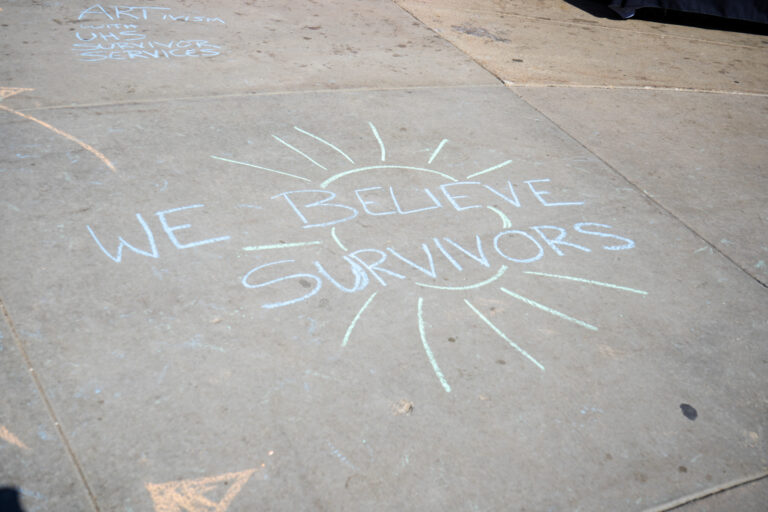You have options
UHS is a confidential, non-judgmental place for students of all genders to discuss options, regardless if they were drinking.
UHS can review the risk of pregnancy, STIs, and physical injuries with the student, and provide more information about reporting options, emotional support, and academic accommodations.
Population-specific resources can be found further down this page.
Emergency help after a sexual assault
911
If you are in immediate danger and want police assistance.
608-852-9533
Urgent medical concerns, including your physical well-being after an assault
608-264-2677
Contact the University of Wisconsin Police Department
UHS is here for you

If you have been sexually assaulted, or are not sure, there are several ways to get medical support:
- Make an appointment online via MyUHS or by call 608-265-5600 (option 1).
- Speak to a nurse about options following sexual assault by calling 608-852-9533 during UHS open hours (Monday through Friday, 8:30 am–5 pm). You may remain anonymous.
- After 5 pm, call the UHS Crisis Line at 608-265-5600 (option 9) or the Rape Crisis Center 24-hour line at 608-251-7273 for support.
- Drop-in to the 6th floor and ask to speak with a nurse during clinic hours (Monday through Friday, 9 am–5 pm).
Sexual assault survivor resources
This is an accordion element with a series of buttons that open and close related content panels.
Medical Services
For urgent medical concerns, including your physical well-being after an assault, call 608-265-5600 (option 1).
During business hours, you can call UHS to talk about all options and/or make an appointment, drop in and request a same-day appointment, or use MyUHS to make an appointment in Primary Care, the Gynecology, or the Sexual Health Clinic.
Mental Health Services
24/7 mental health and crisis support following an assault
608-265-5600 (option 9)
Free, confidential victim advocacy and survivor support, including information about your options and emotionally supportive counseling
608-265-5600 (option 3)
In Madison
The Rape Crisis Center provides free and confidential services, including a 24-hour hotline at 608-251-7273.
The Unity Point – Meriter Hospital emergency room offers evidence collection (“rape kit”) and medical care (e.g., toxicology screen, STI testing/treatment, emergency contraception, injury treatment) through the Forensic Nurse Examiner Program. No appointment needed. You do not need to report to law enforcement to use this service. 608-417-5916
Outside of Madison
The National Sexual Assault Hotline provides free and confidential support and connects to a rape crisis center in your area. 1-800-656-4673. A free 24-hour text chat is also available.
More information
This is an accordion element with a series of buttons that open and close related content panels.
What to do after a sexual assault
After a sexual assault, it is important that you know you have choices about how to take care of yourself. There is no one right way to ensure your self-care.
Listed here are several options, offering you suggestions on how to meet your physical safety and emotional needs, how to obtain medical attention, and options for filing a report to trigger an investigation.
Reports can be filed with the law enforcement agency in which the incident occurred or with a campus office designated by UW–Madison for sexual violence/Title IX investigations. These offices are the Sexual Misconduct Resource and Response Program and the Office of Student Assistance and Support. If you choose to report, you can bring a victim advocate or support person with you to do so.
For more about the services, both on- and off-campus, available to survivors of sexual assault, see the UHS Survivor Services webpage. You can get confidential help without reporting.
There are trained staff who offer support to students who have experienced sexual assault. Make an appointment with UHS Survivor Services.
Remember, there are many paths to healing, and only you know what you need.
What is consent?
Consent is a clear yes, not the absence of a no.
Sexual assault is any sexual contact made without consent. Consent must be freely given with overt words or actions that clearly communicate an individual’s desire to engage in sexual activities. Consent is a clear yes, not the absence of a no. Consent cannot legally be obtained if an individual is incapacitated due to alcohol or other drugs, is unconscious or asleep, or has limited mental capacity. Examples of sexual assault include unwanted touching, kissing, fondling, or penetration of the mouth, vagina, or anus with a finger, penis or object.
Sexual assault is always the fault of the perpetrator and not the fault of the victim. Whether or not the victim has been drinking is irrelevant. The victim’s previous sexual activities, behaviors, actions and/or dress is irrelevant. No one deserves to be the victim of sexual assault.
Alcohol and drug-facilitated sexual assault
Alcohol is the most common drug used by perpetrators to facilitate sexual assault.
Most drugs used to facilitate sexual assault fall into one of the following categories:
- sedatives: make you feel weak or knock you unconscious
- dissociative drugs: make you feel disconnected from or unable to control your body
- hallucinogens: make you hallucinate and disoriented
- drugs that cause amnesia
These drugs take away your control so that the perpetrator is in charge of the situation. In certain doses, any drug can be used in a sexual assault, including alcohol, marijuana, Ecstasy, as well as drugs commonly used to facilitate sexual assault including GHB, Rohypnol, Clonazepam, ketamine, and chloral hydrate.
Most drugs used to facilitate sexual assault leave the body within 24 to 72 hours, so if you want to get a drug test it is important to do it as soon as possible after the assault has occurred. If you aren’t able to get tested in time, you can still file sexual assault report if you wish.
For drug testing and/or examination after a sexual assault, contact:
UnityPoint Health – Meriter
Forensic Nurse Examiner Program
608-417-5916
202 S. Park Street (enter the Emergency Department entrance)
Group counseling for survivors
See group counseling options specific for survivors on the UHS Group Counseling webpage.